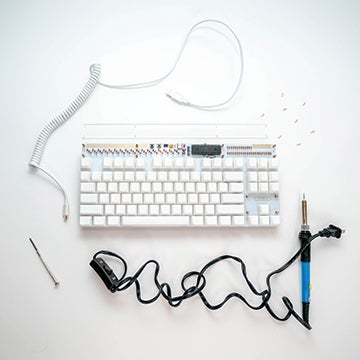I’m a Nerd About ... Mechanical Keyboards
Phillip Tran builds his own keyboards for a more personalized computer experience.

As a computer science and math major, Phillip Tran ’25 spends at least eight hours a day using his keyboard: completing assignments, playing games with friends or as he admits, “unironically going on typing test websites to practice my typing skills.”
Tran wants all of those hours to be as enjoyable as possible — so when he’s running around campus, he uses a pre-built Logitech MX Keys Mini keyboard that is “very minimal.” At home, he’ll often switch to his own custom-built keyboard, which holds blank keys and makes “a beautiful ‘thonk’ sound.”
Tran’s fascination with both computers and mechanical keyboards started in his early teens. “When I was 13, I wanted to build a computer to play games. I saved all my money from birthdays and Christmas then bought all the individual parts,” he said. For Tran, building that first custom computer was not unlike putting together Legos.
Mechanical keyboards have exploded in popularity recently, partly as a result of Autonomous Sensory Meridian Response (ASMR) videos, which show people typing on different boards that sound aesthetically pleasing to the ear. Because of a switch used underneath the keycaps that registers which key is being pressed, custom or homemade keyboards sound and feel very different from the average keyboard.
By his senior year of high school, Tran wanted to try building his own mechanical keyboard. “I started from zero, going on Reddit forums and watching YouTube videos.” Many steps go into this hobby, from soldering switches to picking out keycaps. “When you’re first looking at the parts and trying to determine what you want, how you want it to sound and feel, it’s really exciting. You get to customize every single part however you want and see it all come together.”
Tran’s best advice for novice keyboard builders? “Don’t be a broke college student,” he said jokingly. Building custom keyboards can be time-consuming and expensive ($200–$600). “For the amount of time I spend on my keyboard,” said Tran, “it’s worth it.”
Key Terms: Beginner terms for future keyboard enthusiasts

PCB: a printed circuit board, aka “the brains of the keyboard,” which connects the user’s inputs to the output on the computer
Keycaps: covers for the top of switches; a main element for aesthetic customization
Plate: a holder for keyboard switches that attaches to the PCB; different plate materials (aluminum, brass, etc.) change the sound produced
Switches: covered up by the keycaps; communicates with the computer through the PCB and affects the sound and feel of typing
Case: a frame for holding all the individual components together sturdily
— Emma Korsmo ’24
